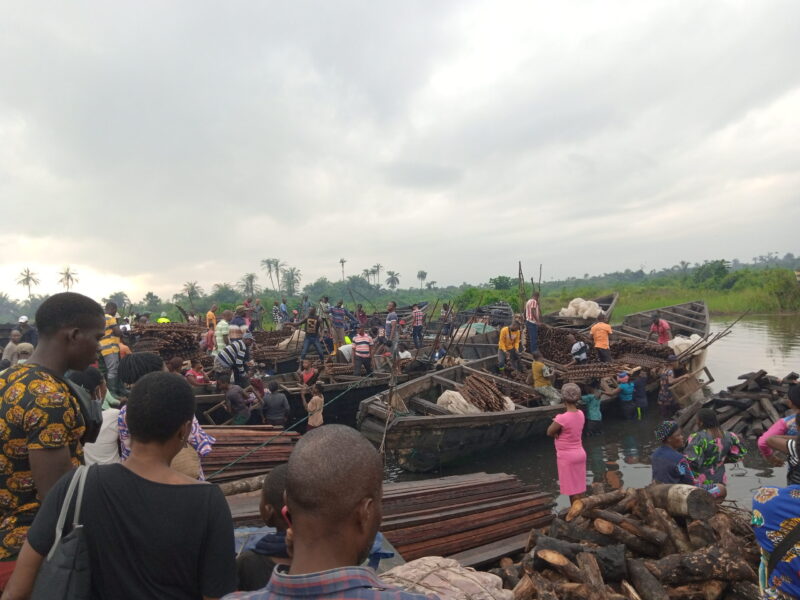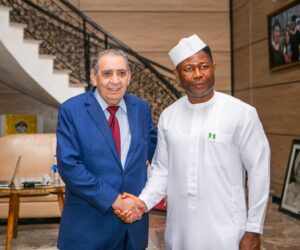The first part of this series captured the stories of piracy, loss, and survival among small-scale fishers and women traders across Nigeria’s coast. This second instalment turns the spotlight on government inaction – the absence of real policies, protection, or support for the country’s poorest coastal workers.
Ghanaian fisher James Nana arrived in Ibaka, Nigeria, in 1992, at a time he said the sea was kind. Fish were abundant, and fishermen did not worry about being attacked.
“You could sail into the water anytime, and return with a good catch – without any fear. No pirates, nothing,” he recalled.
At 24, Mr Nana fished daily, sold his catch, and prospered enough to buy land and build a house in one of Nigeria’s largest fishing towns. Years later, he invited his two brothers to join him. But the tides changed.
After Nigeria returned to civil rule in 1999, insecurity began to creep into its Atlantic coast. Armed gangs demanding a share of the Niger Delta’s oil wealth raided installations, kidnapped crews, and looted vessels. By the late 2010s, the attacks had shifted to smaller targets: artisanal fishers, the backbone of Nigeria’s coastal economy, who were already struggling with dwindling fish stocks, overfishing and erratic weather.
Mr Nana and his brothers were repeatedly attacked in the water by armed men who carted away their outboard engines. Their youngest brother lost three engines in separate raids, sank into depression and died after a stroke.
The surviving brothers had just returned from his funeral in Ghana’s central region before an interview in August. “These people are very wicked,” said the second brother, Kwabena Benjamin, referring to the criminals, his eyes wide. “They are very wicked.”
Authorities insist Nigerian waters are safe, claiming there have been no recorded pirate attacks on vessels in four years. Yet, attacks on small-scale fishers and traders, who are mostly women, have continued.
At least 14 incidents in which 106 fishers, traders and others were abducted and at least three killed have occurred since 2021, according to our tally, based on news reports. Fishermen and traders said far more attacks took place, many unreported.
This year, community leaders in Ibeno and Ibaka in Akwa Ibom State, and Andoni in Rivers State, said several attacks on small boats have occurred, and a week hardly goes by without an incident. The attacks include engine thefts, kidnappings, and sometimes killings. They estimate thousands are affected each year.
The staggering contradiction between the official position and the daily realities of small-scale fishers, experts say, points to a broader problem: the neglect of a sector that sustains millions but receives little protection or support.
“The neglect is overwhelming,” said Stanley Godspower, director of FishNet Alliance, a regional network that advocates sustainable fishing and the rights of small-scale fishers across Africa. “People have lost lives to piracy, but the government’s focus is always on large vessels, oil and gas.”

Big employer, little attention
Nigeria’s artisanal fishing industry – the country’s largest informal maritime workforce – employs more than 6 million people, more than the entire civil service, and supplies most of the nation’s fish needs. Yet it operates almost entirely outside formal government policy structures.
The country has no functional national fisheries policy and lacks comprehensive programmes to support small-scale fishers in terms of security, training, and welfare. There is no national registry, credit system, or insurance scheme for the millions who depend on the sea for their livelihoods.
By contrast, smaller West African neighbours on the Gulf of Guinea, such as Sierra Leone, Liberia, and Guinea, have launched co-managed fishing zones and community programmes that better support and protect artisanal fishers.
“The attacks on fishing communities have continued despite protests by the fishermen,” said Ibanga Ibok, a scholar at the Department of Agricultural Economics and Extension, Akwa Ibom State University, who has researched the impact of sea robbery on artisanal fish production. “I do not know of any response from the government since my 2024 study.”
The Federal Department of Fisheries and Aquaculture began work on a new National Fisheries and Aquaculture Policy in 2022, with support from the International Food Policy Research Institute (IFPRI) and WorldFish.
The draft 2025–2029 policy aims to close Nigeria’s fish supply gap by improving access to inputs and infrastructure while promoting sustainable practices. For the artisanal sector, it promises training, technical support, and financing to boost small-scale fishers’ productivity. Overall goals include raising aquaculture and artisanal output, cutting post-harvest losses by half, creating jobs, and promoting climate-resilient, eco-friendly fishing.
More than two years later, the proposal remains unapproved. During a review session in November 2024, Anthony Onoja, professor and director, Institute of Agricultural Research and Development, University of Port Harcourt, and head of the policy drafting team, said: “Since the history of this country, there has never been a working and implemented policy on fisheries and aquaculture.”
In August, Marine and Blue Economy Minister Adegboyega Oyetola said the policy and a new Fisheries Bill were being finalised as part of a Fish Production Acceleration Roadmap aimed at improving governance and reducing Nigeria’s annual 2.2 million metric tonnes of fish imports.

Broadly, the new ministry, created in 2023 to align with the African Union’s Blue Economy Strategy and UN Sustainable Development Goal 14 on sustainable marine resource use, has made little progress in addressing the problems facing coastal communities and livelihoods.
On paper, the ministry’s mandate spans fisheries and aquaculture, marine conservation, shipping, coastal tourism, and other blue economy sectors. In practice, officials and analysts say its focus has been skewed toward revenue-generating activities – shipping, port development, and offshore energy – while social and environmental priorities are paid less attention.
One official said the ministry had no major programmes for conservation or protecting local coastal communities yet. “We are still evolving,” he said, asking not to be named.
In the 2025 budget of the Ministry of Marine and Blue Economy headquarters, which oversees coastal programmes nationwide, ₦12.2 billion was approved for more than a hundred projects. Of this, only two allocations directly target artisanal fisheries: ₦390 million for patrol boats and trawlers to monitor, control, and surveil fishing activities; and ₦189 million for input support to artisanal fishers, including boats, nets, floats, and weighing scales.
There were no indications the allocations were implemented. A search on GovSpend, a platform that tracks daily government expenditure, showed no record of disbursements for either programme. Over two dozen fishers interviewed across four locations reported not receiving or being aware of any government support.
Disastrous neglect

The policy vacuum leaves the seas open to abuse and overexploitation of resources. Large trawlers, some foreign-owned that operate in Nigerian waters illegally, continue to apply damaging fishing methods, thereby fuelling stock decline.
In Ibeno, Akwa Ibom State, on Nigeria’s southern coast, hundreds of women crowd a noisy, dimly lit shack near the shoreline, haggling over sacks of iced fish tossed from anchored boats.
The women are fish traders. On good days, they buy fresh catch from local fishers, smoke or dry it, and send it by road to markets in Uyo, Lagos, and even Abuja. But when the fishers cannot go out, or return with a poor catch, the women turn to the only other source of supply: deep-sea trawlers.
The vessels anchor far offshore and use massive nets that drag the ocean floor, scooping up everything in their path – including juvenile fish vital to ecosystem renewal. After sorting out premium species, the leftover mix of undersized fish is packed in ice and sent to shore, where traders like those in Ibeno buy them in bulk.
“The small boats go to the vessels and load the leftovers, which they bring back to sell to women at the shore,” one trader said.
Marine experts say this trade in “bycatch” – the unwanted haul from industrial trawlers – is both ecologically and economically disastrous.
“There is a lot of attention diverted from this sector,” said Brave Imiete, marine policy analyst and director of Ocean Stewardship International in Port Harcourt.
“That is why we have challenges monitoring and conducting surveillance of this particular area. Because of that, there has been exploitation by fishing vessels – fishing without licence, fishing using prohibited gears, or fishing illegally in restricted areas. Unfortunately, the waters of Nigeria are plagued with this illegal and unregulated fishing, and it has very high negative impact on the locals.”
He said that some of the vessels are outright poachers, while others are licensed fleets that take advantage of weak enforcement.
“Some of them are stealing from Nigerian waters without permits. Others may be legal fishing fleets, but because of lack of monitoring and surveillance controlling these activities, they take more and different fish than what their licence allows them to,” he said.
“There are rarely accurate records of the number of some of those bycatch they take – sharks, turtles, whales, and other non-target and often endangered species – killed by these indiscriminate, illegal systems, more especially bottom trawling,” Mr Imiete added. “The agencies responsible for checkmating this are under-resourced, and this complete impunity depletes local fish populations.”
Rising Piracy
As part of its regulatory mandate, the Ministry of Marine and Blue Economy aims to train 4,000 seafarers by 2027. The Nigerian Maritime Administration and Safety Agency (NIMASA), under the ministry’s supervision, shares responsibility with the Navy and marine police for securing Nigeria’s waters. Yet fishers and traders say patrols are infrequent, responses slow, and security forces are sometimes outmatched by better-armed attackers.
“The government is supposed to provide security on the water,” Mr Nana said. “There is no security here. The Navy is on other operations too. If they are in the water, the criminals don’t come – but they can’t stay overnight.”
Past statements from the Navy and the Police cited increased patrols to curb attacks at sea. However, data submitted by the Navy and NIMASA to the International Maritime Bureau, showing a sharp decline in piracy and sea robbery, makes no mention of incidents affecting small-scale fishers. They focus instead on large commercial vessels.
Even so, analysts note that the decline in attacks on ships has been largely due to international efforts and partnerships, not necessarily improved local enforcement. This, they say, partly explains why artisanal fishers remain exposed, as such foreign arrangements do not extend to them.
“The problem of maritime insecurity hasn’t gone away because maritime policing is not a culture,” said Confidence MacHarry, a security analyst at the risk consultancy SBM Intelligence. “Except maybe only Lagos that has a dedicated unit for policing the maritime zone.”
Travelling through Nigeria’s coastal belt reveals a striking contrast. Roads are heavily policed, with military and paramilitary checkpoints extracting bribes from motorists.
At each stop, drivers pay between ₦200 and ₦500 per vehicle, though military checkpoints often demand more. At one border patrol post near Oron, police officers collected ₦3,500 from a bus driver transporting unidentified cargo – a bribe he willingly paid despite carrying only two passengers, likely because his shipment was contraband.
“They asked for ₦4,000,” he explained, “but I managed to plead it down.”
Such security, or the appearance of it, ironically does not extend to the sea.
The police did not respond to requests for comment. Visits to the Akwa Ibom State command in Uyo, as well as calls and messages, went unanswered.
The Navy also gave no response after a visit to its Port Harcourt base, calls, and messages. Spokesperson Adams Aliu confirmed receiving the questions but did not reply.
NIMASA spokesperson Edward Osagie likewise acknowledged receipt of inquiries but declined to comment and did not return calls.
In response to growing insecurity, fishers and traders now contribute part of their earnings to fund vigilante security groups. That is in addition to paying the criminals that attack them a “protection fee” periodically.
“That has helped us, better than before,” said Nduekiden Eshiet. “I don’t know when this menace will stop. Twenty years ago, Ibeno was a peaceful place. You could be in the sea at any time, but not like that anymore.”

The problem ripples down to other workers in the community. Daniel Inyang, a boat engine technician, said his livelihood depends entirely on the safety of those at sea.
READ ALSO: SPECIAL REPORT: Farmers, fishermen suffer as oil spills persist in Niger Delta communities
“When engines are seized or fishermen are kidnapped, I don’t have work,” he lamented as he bent over a damaged outboard motor. “I also need help.”
Mr Nana and his brother, Kwabena Benjamin, have been out of work since losing their last engine in an attack. He recalled how, years ago, their community appealed to Ghana’s ambassador in Nigeria, who in turn met with the Nigerian Navy to seek protection. The envoy later advised them that if things did not improve, they should consider returning to Ghana.
Mr Nana has refused to heed that advice. Despite the possibility of another attack, he plans to buy a new engine and return to sea. “I can’t wait to go back to the water,” he said quietly. “That’s where we belong.”










